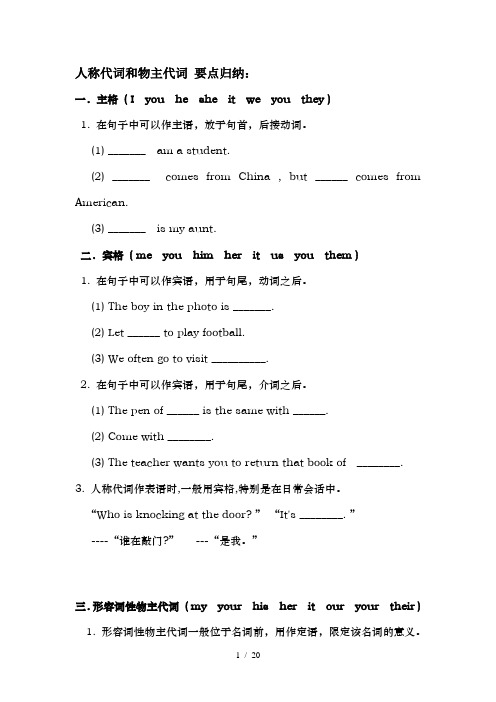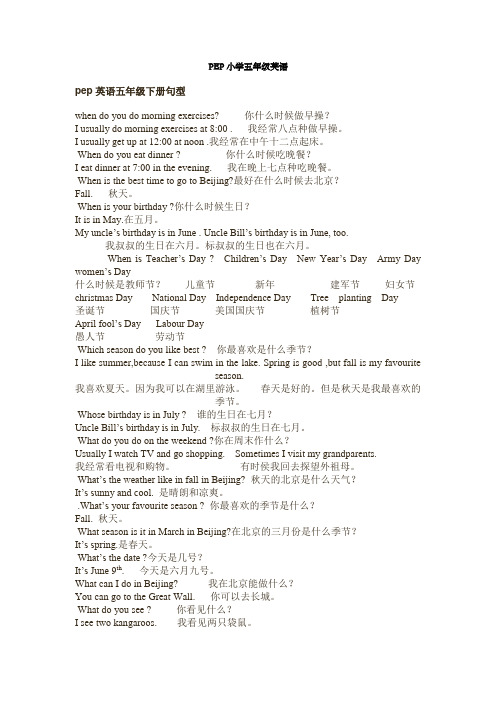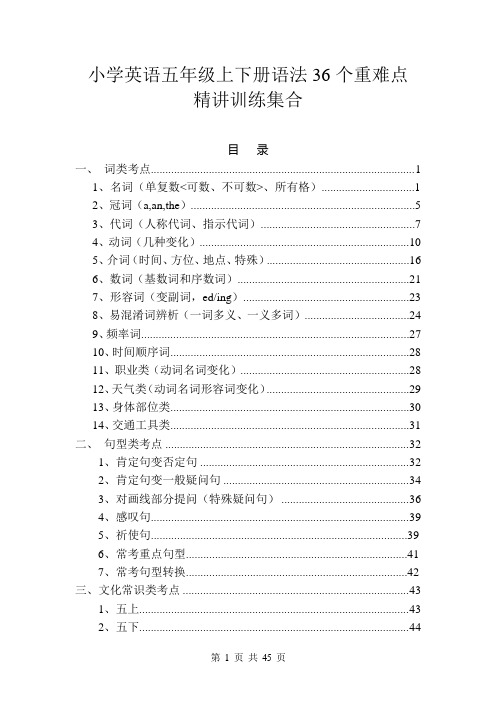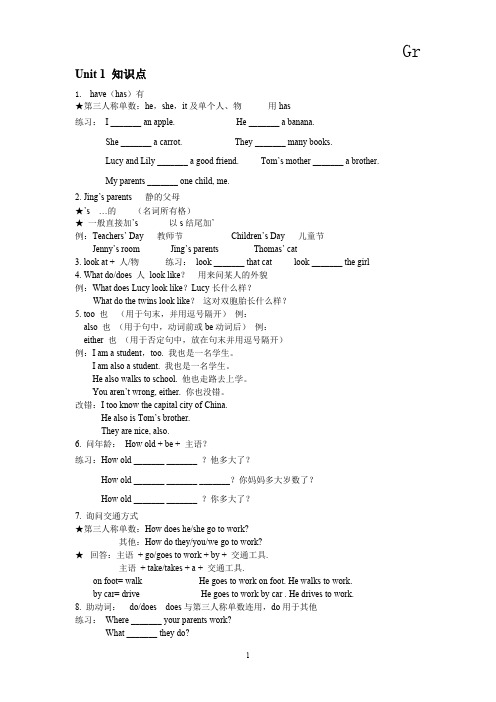小学五年级英语语法要点及习题
小学五年级英语语法练习

人称代词和物主代词要点归纳:一.主格( I you he she it we you they )1. 在句子中可以作主语,放于句首,后接动词。
(1) _______ am a student.(2) _______ comes from China , but ______ comes from American.(3) _______ is my aunt.二.宾格( me you him her it us you them )1. 在句子中可以作宾语,用于句尾,动词之后。
(1) The boy in the photo is _______.(2) Let ______ to play football.(3) We often go to visit __________.2. 在句子中可以作宾语,用于句尾,介词之后。
(1) The pen of ______ is the same with ______.(2) Come with ________.(3) The teacher wants you to return that book of ________.3. 人称代词作表语时,一般用宾格,特别是在日常会话中。
“Who is knocking at the door? ” “It's ________. ”----“谁在敲门?”---“是我。
”三.形容词性物主代词( my your his her it our your their ) 1. 形容词性物主代词一般位于名词前,用作定语,限定该名词的意义。
(1) ______ book is over there.(2) I ate all ________ sandwiches yesterday.(3) Tell Tom not to forget _______ book.四.名词性物主代词( mine yours his hers its ours yourrs theirs)1. 名词性物主代词在句中独立使用,即不后接名词,其句法作用相当于一个名词,即“形容词性物主代词+名词”。
PEP小学五年级英语语法要点及习题-现在进行时

PEP小学五年级英语pep英语五年级下册句型when do you do morning exercises? 你什么时候做早操?I usually do morning exercises at 8:00 . 我经常八点种做早操。
I usually get up at 12:00 at noon .我经常在中午十二点起床。
When do you eat dinner ? 你什么时候吃晚餐?I eat dinner at 7:00 in the evening. 我在晚上七点种吃晚餐。
When is the best time to go to Beijing?最好在什么时候去北京?Fall. 秋天。
When is your birthday ?你什么时候生日?It is in May.在五月。
My uncle’s birthday is in June . Uncle Bill’s birthday is in June, too.我叔叔的生日在六月。
标叔叔的生日也在六月。
When is Teacher’s Day ? Children’s Day New Year’s Day Army Day women’s Day什么时候是教师节?儿童节新年建军节妇女节christmas Day National Day Independence Day Tree planting Day圣诞节国庆节美国国庆节植树节April fool’s Day Labour Day愚人节劳动节Which season do you like best ? 你最喜欢是什么季节?I like summer,because I can swim in the lake. Spring is good ,but fall is my favouriteseason.我喜欢夏天。
因为我可以在湖里游泳。
春天是好的。
但是秋天是我最喜欢的季节。
Unit 6 语法(复习讲义)五年级英语上册(译林版三起)

Unit 6 My e-friend语法梳理:一般现在时的疑问句精讲精练(含答案)一、一般现在时的一般疑问句一般疑问句是疑问句的一种,通常读升调,一般用yes或no来回答。
1.be动词引导的一般疑问句,基本结构为“Am/Is/Are+主语+其他?”。
例如:—Are you a student?你是一名学生吗?—Yes,I am.是的,我是。
—Is your father a teacher?你的父亲是一名教师吗?—No, he isn't. 不,他不是。
2.情态动词(can, would, should等)引导的一般疑问句,基本结构为“情态动词+主语+动词原形+其他?”。
例如:—Can you play basketball? 你会打篮球吗?—Yes,I can. 是的,我会。
/No, I can't. 不,我不会。
注意:情态动词本身有一定的词义,但是通常不独立作谓语,一般和动词原形一起使用,表示说话人对这一动作或状态的看法或主观设想。
情态动词本身没有第三人称单数形式,后面一般接动词原形。
3.助动词do/does引导的一般疑问句,基本结构为“助动词+主语+动词原形+其他?”。
例如:—Do you like this dog?你喜欢这只狗吗?—Yes, I do. 是的,我喜欢。
/No, I don't. 不,我不喜欢。
—Does Yang Ling play the piano at home? 杨玲在家弹钢琴吗?—Yes, she does. 是的,她弹。
/No, she doesn't. 不,她不弹。
注意:do/does提问的一般疑问句也要用do/does 或don’t/doesn’t回答。
二、一般现在时的特殊疑问句以特殊疑问词开头,对句子中的某一成分进行提问的句子叫特殊疑问句,一般读降调。
常用的疑问词有what, where, who, when, why, which, how等。
(完整版)小学五年级英语语法以及8份练习题

语法及练习1 be动词Be 动词的用法:(1) Am--was Is --was Are--were 口诀:我用am, 你用are, is用在他她它,复数全用are。
(2) 肯定和否定句I am (not) from London. He is(not) a teacher. She is(not) in the dining room. My hair is(not) long. Her eyes are(not) small.(3) 一般疑问句Are you a Chinese? Yes, I am. No, I am n’t. Are they American? Yes, they are. No, they aren’t. Is the cat fat? Yes, it is. No, it isn’t.用恰当的be动词填空。
1. I ______ a boy. ______ you a boy? No, I _____ not.2. The girl______ Jack's sister.3. The dog _______ tall and fat.4. The man with big eyes _______ a teacher.5. ______ your brother in the classroom?6. Where _____ your mother? She ______ at home.7. How _______ your father?8. Mike and Liu Tao ______ at school.9. Whose dress ______ this?10. Whose socks ______ they?11. That ______ my red skirt.12. Who ______ I?13.The jeans ______ on the desk.14. Here ______ a scarf for you.15. Here ______ some sweaters for you.16. The black gloves ______ for Su Yang.17. This pair of gloves ______ for Yang Ling.18. The two cups of milk _____ for me.19. Some tea ______ in the glass.20. Gao shan's shirt _______ over there.21. My sister's name ______Nancy.22. This ______ not Wang Fang's pencil.23. ______ David and Helen from England?24. There ______ a girl in the room.25. There ______ some apples on the tree.26. _______ there any kites in the classroom?27. _______ there any apple juice in the bottle?28. There _______ some bread on the plate.29. There _______ a boy, two girls, three men and ten women in the park.30. You, he and I ______ from China.语法及练习2 人称代词和物主代词人称代词和物主代词1.人称代词主格和宾格的区别:主格通常位于句中第一个动词之前(有时候位于than 之后),宾格一般位于动词或介词之后。
外研社小学英语一起小学5五年级下语法总结及练习题

外研社五年级下语法总结及练习题I. 一般现在时A. 功能:1.表示事物或人物的特征、状态。
如:The sky is blue.天空是蓝色的。
2.表示经常性或习惯性的动作。
如:I get up at six every day.我每天六点起床。
3.表示客观现实。
如:The earth goes around the sun.地球绕着太阳转。
B. 构成:1. be动词:主语+be(am, is, are)+其它。
注意:(我用am,你用are,三单is,复数are。
)肯定句:主语+be+其它. 如:He is a worker. 他是工人。
否定句:主语+ be + not +其它. 如He is not a worker.他不是工人。
一般疑问句:Be +主语+其它? 如:Is he a worker?特殊疑问句:疑问词+一般疑问句? Where is your bike?2.行为动词:主语+行为动词(+其它).如:We study English.我们学习英语。
注意:(当主语为第三人称单数(he, she, it)时,要在动词后加"-s"或"-es"。
如:Mary likes Chinese.玛丽喜欢汉语。
肯定句:主语+动词原形(+其它). 如:I like bread.否定句:主语+ don't( doesn't ) +动词原形(+其它)。
如:I don't like bread.当主语为第三人称单数时,要用doesn't构成否定句。
如:He ofter plays football. He doesn't often play football.一般疑问句:Do( Does ) +主语+动词原形+其它?如:Do you often play football?- Yes, I do. / No, I don't.当主语为第三人称单数时,要用does构成一般疑问句。
译林版小学英语五年级全册语法重难点讲解训练集合

小学英语五年级上下册语法36个重难点精讲训练集合目录一、词类考点 (1)1、名词(单复数<可数、不可数>、所有格) (1)2、冠词(a,an,the) (5)3、代词(人称代词、指示代词) (7)4、动词(几种变化) (10)5、介词(时间、方位、地点、特殊) (16)6、数词(基数词和序数词) (21)7、形容词(变副词,ed/ing) (23)8、易混淆词辨析(一词多义、一义多词) (24)9、频率词 (27)10、时间顺序词 (28)11、职业类(动词名词变化) (28)12、天气类(动词名词形容词变化) (29)13、身体部位类 (30)14、交通工具类 (31)二、句型类考点 (32)1、肯定句变否定句 (32)2、肯定句变一般疑问句 (34)3、对画线部分提问(特殊疑问句) (36)4、感叹句 (39)5、祈使句 (39)6、常考重点句型 (41)7、常考句型转换 (42)三、文化常识类考点 (43)1、五上 (43)2、五下 (44)一、词类考点(一)名词1、名词单复数(1)可数名词变复数。
当句子主语是多个(≥2)或表达这一类物品时,可数名词要用复数形式。
如:Eg:There are some oranges on the table.(桌子上有一些橘子)Eg:I like bears.(我喜欢熊)可数名词变复数有一下几种规则:a.直接加-s,如:pen-pens, cake-cakes, kite-kites, car-cars;b.以s、x、sh、ch 结尾的,加-es,如:bus-buses, box-boxes, dress-dresses, dish-dishes(盘子), watch-watches(手表);c.以“辅音字母+y”结尾,变y 为i, 再加-es,如:country-countries,family-families, hobby-hobbies, story-stories, body-bodies,library-libraries;d.以“f 或fe”结尾,变f 或fe 为v, 再加-es,如:knife-knives(小刀),leaf-leaves(树叶),thief-thieves(小偷);e.以“o”结尾的词,分两种情况:1>有生命的+es,如:mango-mangoes;tomato-tomatoes;potato-potatoes; hero-heroes。
小学五年级英语语法和练习题

小学五年级英语语法和练习题1.She is quiet.(改为一般疑问句) ______________________________2.He is very tall.(对划线部分提问) ______________________________3.Is Mr. Smith tall and strong?(作肯定回答) ______________________________4.Is Mr. Carter tall?(作否定回答)______________________________5.She is young. She is pretty.(合并为一句) ______________________________6.Is she active?(作否定回答) ______________________________7.She’s very kind and pretty.(对划线部分提问) _____________________________8.That young lady is our principal.(对划线部分提问) ________________________9.Today is Saturday.(对划线部分提问) ______________________________10.W e have Chinese and math on Wednesday.(对划线部分提问)___________________________11.I s she young?(作否定回答)(根据提示完成句子)______________________________12.他又高又瘦。
(汉译英)______________________________13.I like vegetables.(改为否定句) ______________________________14.I would like the orange juice.(对划线部分提问) ______________________________15.A re the apples sour?(作否定回答) ______________________________16.S arah: What do you like? Mike: I like peaches.用第三人称转述这组对话。
(完整版)冀教版五年级英语上册语法点讲解+练习

Gr Unit 1 知识点1.have(has)有★第三人称单数:he,she,it及单个人、物用has练习:I _______ an apple. He _______ a banana.She _______ a carrot. They _______ many books.Lucy and Lily _______ a good friend. Tom’s mother _______ a brother.My parents _______ one child, me.2. Jing’s parents 静的父母★’s …的(名词所有格)★一般直接加’s 以s结尾加’例:Teachers’ Day 教师节Children’s Day 儿童节Jenny’s room Jing’s parents Thomas’ cat3. look at + 人/物练习:look _______ that cat look _______ the girl4. What do/does 人look like?用来问某人的外貌例:What does Lucy look like?Lucy长什么样?What do the twins look like?这对双胞胎长什么样?5. too 也(用于句末,并用逗号隔开)例:also 也(用于句中,动词前或be动词后)例:either 也(用于否定句中,放在句末并用逗号隔开)例:I am a student,too. 我也是一名学生。
I am also a student. 我也是一名学生。
He also walks to school. 他也走路去上学。
You aren’t wrong, either. 你也没错。
改错:I too know the capital city of China.He also is Tom’s brother.They are nice, also.6. 问年龄:How old + be + 主语?练习:How old _______ _______ ?他多大了?How old _______ _______ _______?你妈妈多大岁数了?How old _______ _______ ?你多大了?7. 询问交通方式★第三人称单数:How does he/she go to work?其他:How do they/you/we go to work?★回答:主语+ go/goes to work + by + 交通工具.主语+ take/takes + a + 交通工具.on foot= walk He goes to work on foot. He walks to work.by car= drive He goes to work by car . He drives to work.8. 助动词:do/does does与第三人称单数连用,do用于其他练习:Where _______ your parents work?What _______ they do?GrWhere _______ your uncle do? How _______ he go to work?9. 人称代词人称代词人称主格宾格我I me 第一人称我们we us 第二人称你,你们you you 他he him 她she her 它it it 第三人称他们theythem练习:_______ are my little apple. (你) Please come with _______. (我) _______ is a boy.(他) _______ (她)teaches _______ (我们)English. _______ (你)can call _______ (她)Alice. _______(它) is a tiger.10. 询问某人喜欢做什么What do/does + 主语 + like to do ?What do/does + 主语 + like doing ?练习:What _______ you like to do?What _______ your father like to do?What _______ they like to do?What _______ the students like doing?What _______ Bob and Tom like doing?What _______ Tom like to do?Unit 2 知识点1.各国著名景点Tian’anmen Square 天安门广场 the Palace Museum 故宫博物馆the Great Wall 长城 Niagara Falls 尼加拉瓜瀑布CN Tower 加拿大电视塔 White House 白宫the Statue of Liberty 自由女神像 Big Ben 大本钟Buckingham Palace 白金汉宫 (专有名词首字母要大写)2. 复数变化:city – cities 城市leaf – leaves 叶子3. look “看,瞧” 强调看的动作 see “看” 强调看的结果watch “观看,注视” 强调动作(全神贯注的观看、观察或注视某事物的活动)watch TV watch a film/movie 4. 本单元词组a map of … 。
- 1、下载文档前请自行甄别文档内容的完整性,平台不提供额外的编辑、内容补充、找答案等附加服务。
- 2、"仅部分预览"的文档,不可在线预览部分如存在完整性等问题,可反馈申请退款(可完整预览的文档不适用该条件!)。
- 3、如文档侵犯您的权益,请联系客服反馈,我们会尽快为您处理(人工客服工作时间:9:00-18:30)。
小学英语语法要点及习题----现在进行时
1.现在进行时表示现在正在进行或发生的动作,也可表示当前一段时间内的活动或现阶段正在进行的动作。
2.现在进行时的肯定句基本结构为be+动词ing.
3.现在进行时的否定句在be后加not。
4.现在进行时的一般疑问句把be动词调到句首。
5.现在进行时的特殊疑问的基本结构为:
疑问词不达意 + be + 主语 + 动词ing?
但疑问词当主语时其结构为:
疑问词不达意 + be + 动词ing?
动词加ing的变化规则
1.一般情况下,直接加ing,如:cook-cooking
2.以不发音的e结尾,去e加ing,如:make-making, taste-tasting
3.如果末尾是一个元音字母和一个辅音字母,双写末尾的辅音字母,再加ing,如:run-running, sto p-stopping
现在进行时专项练习:
一、写出下列动词的现在分词:
play________ run__________ swim _________make__________
go_________ like________ write________ _ski___________
read________ have_________ sing ________ dance_________
put_________ see________ buy _________ love____________
live_______ take_________ come ________ get_________
stop_________ sit ________ begin________ shop___________
二、用所给的动词的正确形式填空:
1.The boy __________________ ( draw)a picture now.
2. Listen .Some girls _______________ ( sing)in the classroom .
3. My mother _________________ ( cook )some nice food now.
4. What _____ you ______ ( do ) now?
5. Look . They _______________( have) an English lesson .
6.They ____________(not ,water) the flowers now.
7.Look! the girls ________________(dance )in the classroom .
8.What is our granddaughter doing? She _________(listen ) to music.
9. It’s 5 o’clock now. We _____________(have)supper now
10.______Helen____________(wash )clothes? Yes ,she is .
三、句型转换:
1. They are doing housework .(分别改成一般疑问句和否定句)
_____________________________________________________________
_____________________________________________________________
2.The students are cleaning the classroom . ( 改一般疑问句并作肯定和否定回答)
_________________________________________________________________
_________________________________________________________________
3.I’m playing the football in the playground .(对划线部分进行提问)
_________________________________________________________________
4.Tom is reading books in his study . (对划线部分进行提问)
1. What are you _________(do) now? I ___________(eat) bread.
2. It’s nine o’clock. My father_______________(work) in the office.
3. Look, the boy____________(put) the rubbish into the bin.
4. __________he__________(clean) the classroom? No, he isn’t. He___________ _(play).
5. Where is Mak? He___________(run) on the grass.
6. Listen, who________(sing) in the music room? Oh, Mary______(sing) there.
将下列句子改成现在进行时
1. Tom can speak Chinese.
2. We have four lessons.
3. I watch TV every day.
4. She works in a hospital.
5. Do you like this book?
6. Kitty and Ben have lunch at about twelve.
7. His father can help them.
8. Danny, open the door.
9. They watch TV in the evening
小学英语一般现在时练习
一般现在时:表示经常性的事情。
时间状语:often经常, usually通常, always总是, every每个,
sometimes有时,at…在几点钟
只有第三人称单数用动词三单,其余动词均用原形
三单变化:多数在动词后加
s play—plays like—likes
以s,x,sh,ch,o结尾的动词加
es go—goes wash--washes
以辅音字母加y结尾,把y改i再加
es fly—flies
1. We often___________(play) in the playgound.
2. He _________(get) up at six o’clock.
3. __________you _________(brush) your teeth every morning.
4. What (do) he usually (do) after
school?
5. Danny (study) English,Chinese,Maths,Science and Art an school.
6. Mike sometimes __________(go) to the park with his sister.
7. At eight at night, she __________(watch) TV with his parents.
8. ________ Mike________(read) English every day?
9. How many lessons_________your classmate________(have) on Monday?
10. What time_________his mother_________(do) the housework?
改句子
1. Do you often play football after school? (肯定回答)
2. I have many books. (改为否定句)
3. Gao Shan’s sister likes playing table tennis (改为否定句)
4. She lives in a small town near New York. (改为一般疑问句)
5. I watch TV every day. (改为一般疑问句)
6. David has got a goal. (改为一般疑问句)
7. We have four lessons.(否定句)
8. Nancy doesn’t run fast (肯定句)
9. My dog runs fast.
否定句:
一般疑问句:
10. Mike has two letters for him.
一般疑问句:
否定句:
11. I usually play football on Friday afternoon.
否定句:
一般疑问句:
划线提问
12. Su Yang usually washes some clothes on Saturday.
否定句:
一般疑问句:
划线提问:
13. Mingming usually waters the flowers every day
否定句:
一般疑问句:
划线提问
14. Tom does his homework at home.。
